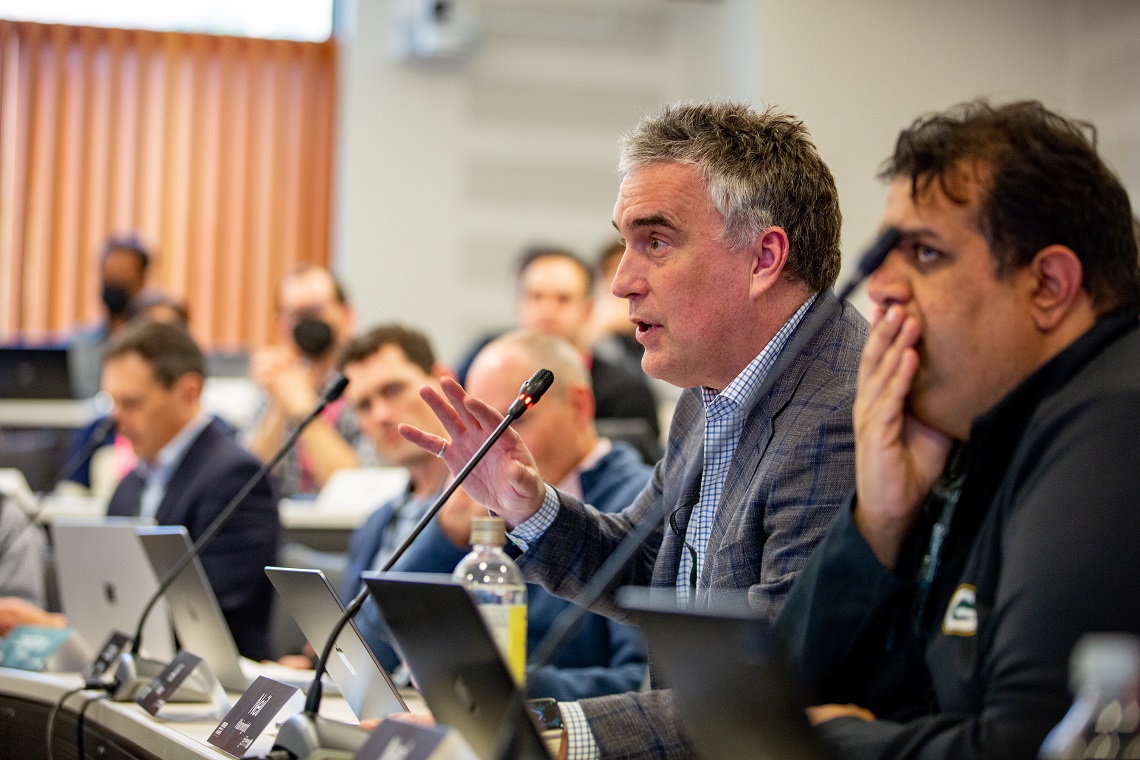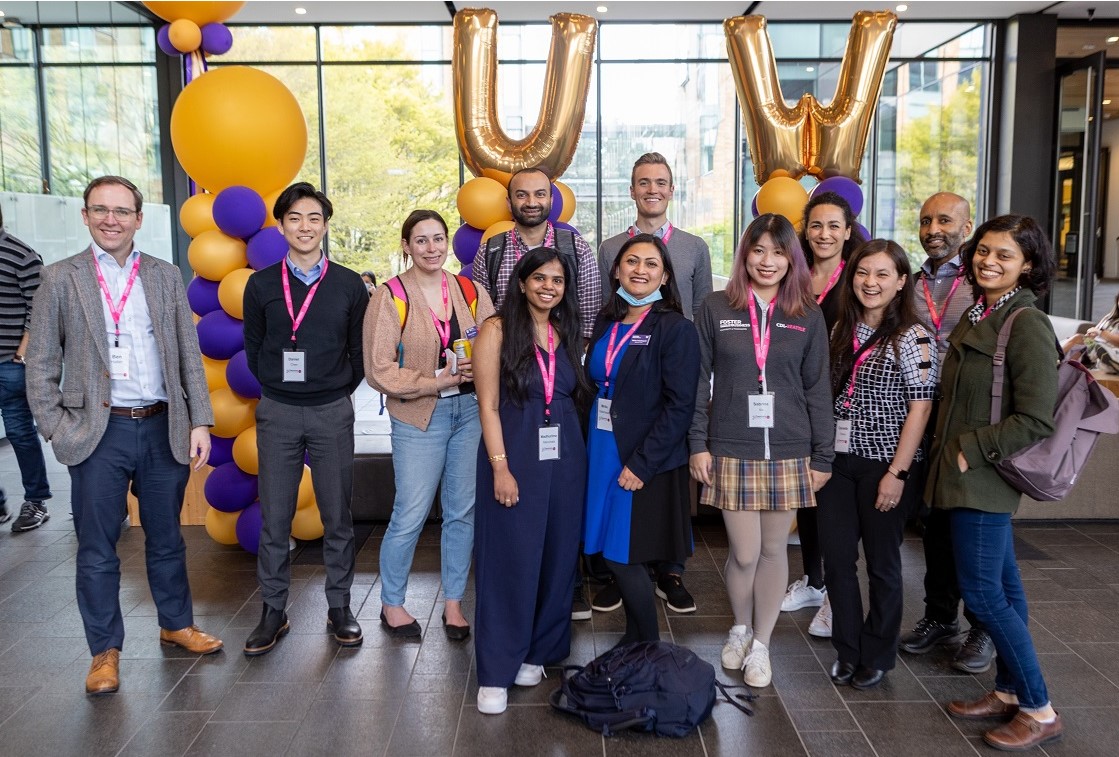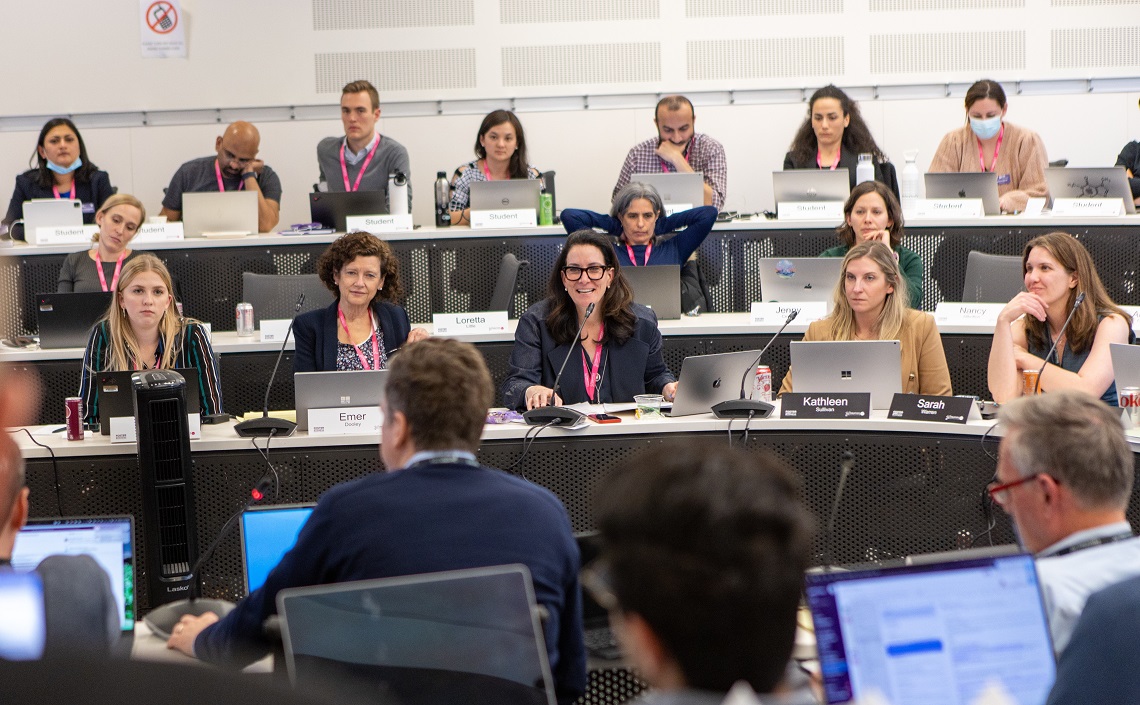Entrepreneurs, Assemble!
Creative Destruction Lab-Seattle convenes its first cohort of computational health startups, mentors and students at the Foster School
It is no small feat to launch a novel kind of entrepreneurship program—one that develops early stage ventures built on computational health innovations—in the teeth of a global pandemic.
But after conducting business online for much of its first year in existence, Seattle’s Creative Destruction Lab (CDL) was finally able to convene its first in-person summit of founders, mentors and students at the University of Washington Foster School of Business in early April.
“We didn’t even exist a year ago,” marveled CDL-Seattle site lead Emer Dooley, an affiliate instructor and Charlene M. and Arthur W. Buerk Endowed Faculty Fellow at the Foster School.

The assemblage before her was worthy of marvel. Packed into a PACCAR Hall classroom were the creators of 11 promising early stage companies built around computational health innovations with massive market potential (the site’s focus), hailing from Seattle and as far away as London and Singapore.
They spent an intensive day absorbing the wisdom of 25-plus mentors—a veritable who’s who of data-driven healthcare operators (Mike Butler of Providence, Cheryl Scott of Evolent Health and the Bill & Melinda Gates Foundation), scientific leaders (Ingrid Swanson Pultz of PvP Biologics, Shwetak Patel of the UW and Google), entrepreneurs (Jesse Salk of Twinstrand Biosciences and Bruce Montgomery of Avalyn Pharma) and investors (Chris Picardo of Madrona Venture Group, Bill McAleer of Voyager Capital, to name just a few).
A rapt audience of CDL founding partners and UW business and STEM students observed from the gallery.
What emerged from this hothouse session was a kind of entrepreneurial alchemy, a collaborative crystallizing of objectives and a focusing of go-to-market strategies.
No less than you’d expect from a program founded on the same entrepreneurial principles that it preaches.
New kind of startup support
CDL-Seattle is the third US location of Creative Destruction Lab, an international nonprofit accelerating the growth of seed-stage science and technology companies that have the potential to scale massively.
Based at the Foster School, CDL-Seattle is a partnership with the UW College of Engineering, Paul G. Allen School of Computer Science & Engineering and CoMotion, the hub for marketing UW innovations.

Each CDL site concentrates on one or more industries—from climate to fintech, oceans to agriculture, blockchain to risk. In Seattle, the initial focus is on applications of artificial intelligence and machine learning to enhance human health.
What CDL offers its participating entrepreneurs is a twist on the conventional accelerator model. Over the nine-month program, participating founders receive:
- mentoring from world-class business leaders, including scientists, engineers, entrepreneurs and investors;
- guidance to set and meet key milestones;
- opportunities to raise capital; and
- business development support from students in the CDL course at Foster.
In return, the founders surrender no equity and pay no fees. CDL is funded through philanthropy and corporate partnerships.
Packed agenda
The program is constructed around a sequence of five concentrated objective-setting sessions, spaced at eight-week intervals. By session 3 of CDL-Seattle, the 20 computational health startups originally selected for the first cohort of CDL-Seattle had been winnowed to 11—a natural attrition in an exacting and specialized program.
The first in-person meeting featured a mix of blunt analysis and collaborative coaching.
In the morning, each of the founders hosted revolving pairings of mentors, who helped pinpoint strategic objectives to achieve on a realistic timeline—realistic if you believe, as participating CDL founding partner Neil Wainwright asserted, that “a founder has 168 hours in a week.”

The afternoon played out with the intensity of a tribunal. The mentor senate debated each company’s merits and objectives in the most candid of terms, while the founders and observers listened carefully. “Our methodology,” says CDL-Seattle director Kristjan Sigurdson, “is to peer-review objectives.”
That’s putting it mildly.
Frank discussion
The day’s many passionate debates were moderated by Dooley and Alice Reimer, site lead at CDL-Rockies, with a friendly but firm voice and the command of an air-traffic controller. Sometimes they let the conversation run. Others, they cold-called on founders or mentors. Or pushed back. As when Reimer asked for volunteers to talk to one of the companies about investing. When no arms went up, she singled out a few of the most-likely suspects and asked them, on the spot, to explain why not.
“It’s invaluable for the founders to hear this,” Dooley explains.
This kind of unvarnished evaluation is perhaps the secret of CDL’s success. It’s a room full of immensely accomplished friends and allies—who will tell you precisely what they think.
“In the wild, when founders meet with VCs, they often just get a no,” Sigurdson says. “At CDL, they hear their business discussed and debated in real time. They get instant feedback.”
Decision time
At the end of the day, the founders filed out of the classroom, and the mentors decided amongst themselves who—if anyone—would work with each company until the next session. And, critically, which companies would continue in the program, which kicked off the most ardent deliberations of the entire day.

“Some of the best advice I got in the program came from hearing the reasons for not inviting us back,” offered CDL alumnus Chris Blackley, the co-founder and CEO of Prescryptive Health.
Ultimately, the mentors decided to cut just one company this session. Another was placed on the bubble, pending review at session 4.
A class by itself
A few days later, the students in Foster’s parallel CDL class met to debrief and discuss what they had just witnessed. Attrition was a hot topic. By now, this collection of Foster MBAs, PhD candidates in the sciences, engineering and computer science, and entrepreneurship undergrads had become emotionally vested in these startups.
That’s because the three-quarter course they enrolled in is like no other. It began with a crash course in high-tech entrepreneurship through a suite of case studies—“on steroids,” according to one student—facilitated expertly by instructors Benjamin Hallen, an associate professor of strategy and entrepreneurship and the Longbrake Endowed Professor in Innovation at the Foster School, and Teddy Johnson, the director of technology development at the UW Institute of Translational Health Sciences.

At the end of fall quarter, the students embedded with one of the startups in the CDL cohort. And that’s where the learning really began.
The CDL course, Hallen explains, is a near perfect expression of the Foster entrepreneurship faculty’s pedagogical model of teaching evidence-based frameworks, then applying them through entrepreneurial practice and rich community engagement—often via the programs and competitions of the Buerk Center for Entrepreneurship.
“This course brings those three points together really well,” Hallen says. “The focus is on a great opportunity for the students to work closely with these high-aspiration ventures built around technological innovations, while also getting to see the process of the founders engaging with these world-class mentors who bring invaluable judgment and wisdom.”
Observation and action
On the immersion side, the students roll up their sleeves and roll out their expertise to help these technical founders develop their astounding innovations into viable businesses.
“How you take an idea all the way to something competing is fascinating,” says Jonathan Bannick (BA 2016), a second-year Foster MBA set to join a boutique life science consulting firm after graduating this spring. “Being able to plug in at this very early stage, when these big strategic decisions are being made, has made a big impact on my understanding the life cycle of these companies.”
On the observation side, Bannick and his classmates are experiencing first-hand the often messy process of a startup interacting with expert advisors and potential investors to fine-tune the business model, find sufficient funding and, ultimately, finesse their way into the market.

“Having a front-row seat to watch these incredibly accomplished mentors provide guidance to the venture founders is just priceless,” says Writu Kakshapati, a Foster Evening MBA who daylights as an assurance manager at an accounting firm.
“The program has provided a powerful toolset to apply in my career.”
The program may have actually altered the career of Danielle Faivre, a doctoral candidate in genome sciences and Foster’s Technology Entrepreneurship Certificate, who came in wary of early stage ventures. “Now that I have some experience with startups and gained some understanding of entrepreneurship, I see the benefits and feel the excitement,” she says. “I would say it is definitely now a question of when I will join a startup instead of if.”
Data + humanity
The classroom discussion following CDL-Seattle session 3 became a forum on the program’s process. Is the intention to create clarity or pose more questions for the founders? Is it better to be coachable or confident? Why do good companies get let go? What is the relationship between data and emotion?
To the entrepreneurial process, CDL-Seattle is a microcosm inside a pressure-cooker. And these students have felt the steam on their faces.
Johnson, who has seen more than his share of high-tech startups, suggested that one big insight to take from the experience should be the importance of humanity—even in the fortunes of these companies that are harnessing big data, AI and machine learning toward revolutionary ends. People make decisions. And emotions matter.
“This is why I love what I call the best game show ever,” says Johnson. “Like it was created by Chekhov.”
An Alliance of Angels
CDL-Seattle is a product of the UW Innovation Roundtable and powered by numerous founding partners, including veteran investors Artie Buerk (BA 1958) of Buerk Dale Victor, Neal Dempsey (BA 1965) of Bay Partners, Bill McAleer of Voyager Capital, Rob Short of Microsoft, Steve Singh of Madrona Venture Group and Arnie Prentice of Kibble & Prentice. Microsoft, Washington Research Foundation, The Foster Foundation and the Allen Institute for AI are corporate partners.
